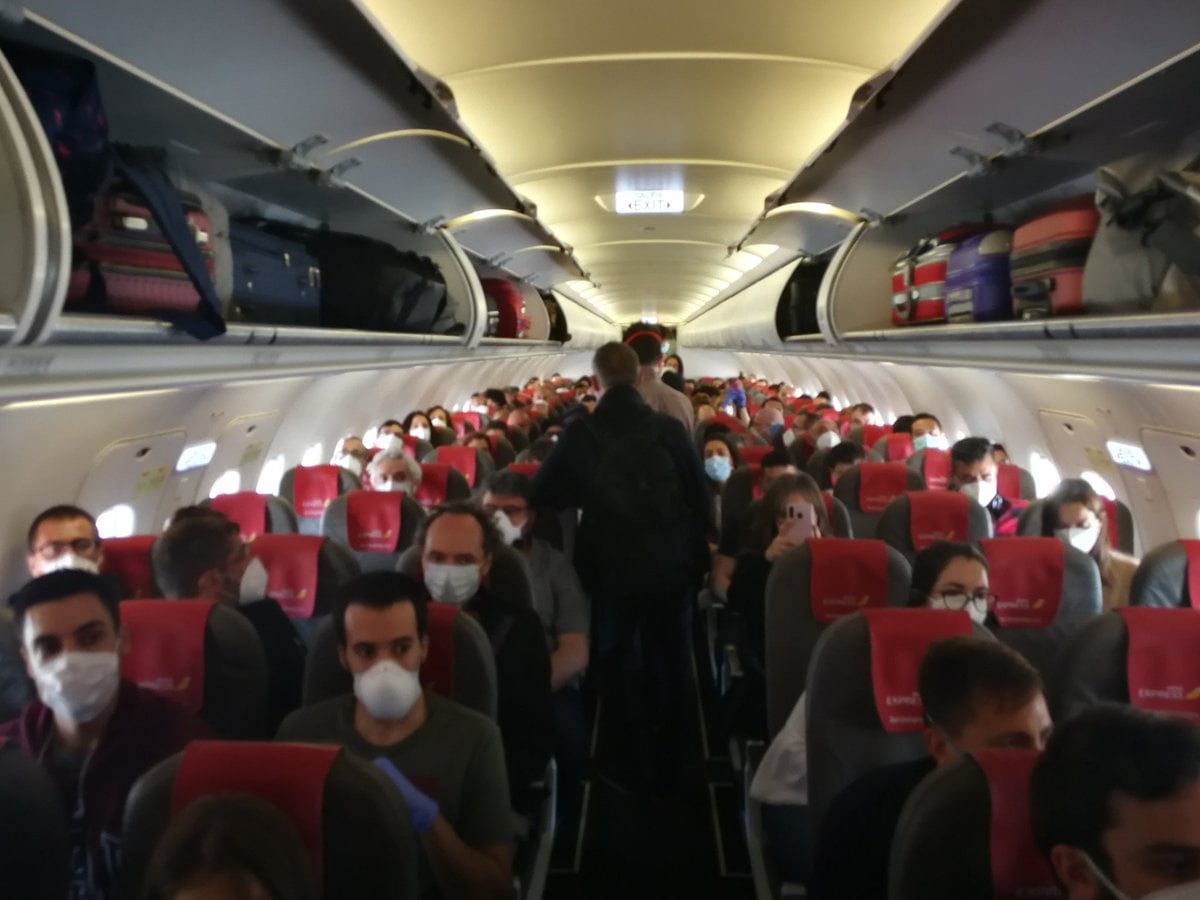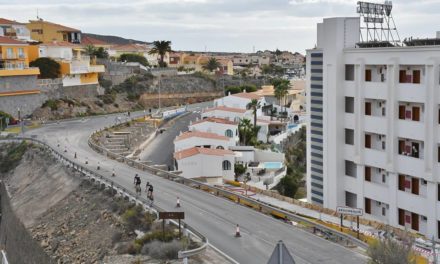 There are already serious concerns regarding how Spain is entering De-escalation Phase 1 conditions and how restrictions are to be implemented by companies hungry to return to business as usual, after an Iberia Express flight to Gran Canaria was revealed to have taken off from Madrid airport last Sunday without any minimum safety distances between passengers, and in spite of tense and vocal complaints from those who purchased tickets.
There are already serious concerns regarding how Spain is entering De-escalation Phase 1 conditions and how restrictions are to be implemented by companies hungry to return to business as usual, after an Iberia Express flight to Gran Canaria was revealed to have taken off from Madrid airport last Sunday without any minimum safety distances between passengers, and in spite of tense and vocal complaints from those who purchased tickets.
Many of those booked on the flight expressed consternation and surprised to see the plane filling up, until every space was full . With no empty seats or rows between each other, several passengers complained to the crew prior to take-off.
Several passengers turned to social networks to take out their frustration and the situation, however the crew’s only response was to offer to let get off, if they wanted, before the flight left.
Anger has also been expressed that absolutely no procedures appeared to be in place to either check temperatures of those boarding the flight, nor even to verify that they had a valid reason for travelling on a three hour flight from Spain’s capital city, the worst affected area of the country, to Gran Canaria one of the least infected Spanish populations.
The Royal Decree 463/2020, dated 14 March, which declared the state of emergency, in managing the coronavirus health crisis does not specifically specify occupancy rates for flights, although there is reference to number of journeys. The document, which brought Spain to a near total standstill two months ago, merely advises that airlines guarantee maximum separation between passengers, literally saying: “For services in which the ticket grants a seat or cabin, the transport operators will take the necessary measures to ensure the maximum possible separation between passengers”.
Two weeks later, the BOE of March 31 included a resolution made March 27, 2020 by the General Directorate of Civil Aviation, establishing conditions for the provision, and specifying air transport services on certain air routes for the Canary Islands Archipelago, during the State of Emergency. This establishes a limit to flight capacity, but it only on inter-island flights . “For these purposes, it will be considered sufficient to offer the public only 50% of the total capacity of each aircraft to ensure proper separation between passengers”.
 The inter-island passenger quotas were never officially specified on flights from any other parts of Spain. The Ministry of Transport has since updated the conditions of air transport for phase 1 of the de-escalation in the Canary Islands and the Balearic Islands. Publishing an on Sunday, May 10 in the BOE and which came into force today, Monday, May 11. The update expressly indicates that operators “must guarantee, through procedures they deem most appropriate, compliance with [the original] article 14.2.g of Royal Decree 463/2020, of March 14”, that is, they must seek “the maximum possible separation between passengers.” once again without specifying ticket sales quotas on connections between the Peninsula and the islands.
The inter-island passenger quotas were never officially specified on flights from any other parts of Spain. The Ministry of Transport has since updated the conditions of air transport for phase 1 of the de-escalation in the Canary Islands and the Balearic Islands. Publishing an on Sunday, May 10 in the BOE and which came into force today, Monday, May 11. The update expressly indicates that operators “must guarantee, through procedures they deem most appropriate, compliance with [the original] article 14.2.g of Royal Decree 463/2020, of March 14”, that is, they must seek “the maximum possible separation between passengers.” once again without specifying ticket sales quotas on connections between the Peninsula and the islands.
The absence of a clear guideline on aircraft occupancy has led to flight companies such as Iberia Express applying their own interpretation of what is, or is not, permissible . The situation on Sunday’s flight is not unique. The Guardia have also denounced other flights from Iberia Express and Air Europa, flying from Madrid and Ibiza and between Palma and Ibiza, respectively, for failing to ensure a safe distance between travellers. Spain’s National Air Authority, AENA, simply clarified that at that time “the number of passengers is solely the responsibility of the airline.”
Many people have expressed grave anger that airlines appear to be allowed to fill their flights to capacity, forcing passengers to sit in close confinement for several hours, when every other sphere of Spanish life has been regulated to 2m minimum distances and the enforced use of personal protective equipment. Until the government makes it clear that there must be a limit to the capacity of all aircraft anyone flying in Spain today is potentially at increased risk of contagion. If we want to try to mitigate a second or third wave of the pandemic in Spain, and to protect the largely uninfected Canary Islands population, we are going to have to do better than that.










